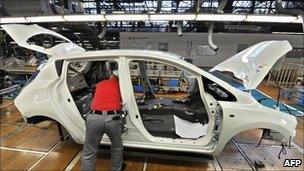Nissan restarts some manufacturing in Japan
- Published

Nissan wants to increase production to help Japan's recovery
Carmaker Nissan has restarted some of its manufacturing in Japan.
"We've managed to get our two plants in Kyushu to restart production," Nissan's Andy Palmer told the BBC.
The resumption comes less than a week after an earthquake and a tsunami severely damaged the country's infrastructure, including some nuclear reactors.
Carmakers in Japan halted production as parts supplies were disrupted and because of electricity shortages.
Difficulties remain
But although some production has resumed, Nissan, which is Japan's second-largest carmaker, is still facing major challenges.
"There are clear issues," Mr Palmer, Nissan's production head, said in an interview with the BBC World Service.
"Some of the suppliers were hit by the quake or the tsunami. We do have some suppliers in the nuclear exclusion zone."
In addition, he added that "transportation is definitely an issue, there are gas supply issues for sure, power outages are causing issues".
Ambitious plans
Mr Palmer acknowledged that the disruption to production would hit Nissan's profits.
On Wednesday, the credit rating agency Fitch warned that Nissan, as well as rival carmakers Toyota and Honda, might see their profits affected in the next few months, largely because the yen has strengthened since the quake.
In spite of this, Mr Palmer is confident the carmaker will continue to increase production.
"The quicker we can get production up and running, not only can we get Nissan back into good shape, but, frankly speaking, we can help get the country back into good shape," he said.
"Our Yokohama plant has been running on a kind of limited operation actually since 13 March.
"Our other major plants, Oppama, Tochigi, Yokohama and Nissan Shatai will all be doing limited operations on 20 March."